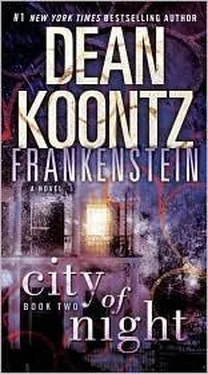The knife wound in his hand has already stopped bleeding. The lacerations will be completely closed in two or three hours.
The splatters of blood on the floor and the appliances distress him. These stains detract from the almost spiritual atmosphere that reigns here. This is a home , and the kitchen is its heart, and at all times there should be a feeling of calm, of peace.
With paper towels and a spray bottle of Windex, he wipes away the blood.
Carefully, without touching her skin, because he does not like the feel of other people’s skin, Randal ties the mother to the chair with lengths of cloth that he tears from the garments in the laundryroom basket.
As he finishes securing her, the mother regains consciousness. She is anxious, agitated, full of questions and assumptions and pleas.
Her shrill tone of voice and her frantic chatter make Randal nervous. She is asking a third question before he can answer the first. Her demands on him are too many, the input from her too great to process.
Rather than hit her, he walks down the hall to the living room, where he stands for a while. Twilight has come. The room is nearly dark. No excited talking mother is present. In mere minutes, he feels much better.
He returns to the kitchen, and the moment he arrives there, the mother starts chattering again.
When he tells her to be quiet, she becomes more vocal than ever, and her pleas become more urgent.
He almost wishes that he were back under the house with the spiders.
She is not behaving like a mother. Mothers are calm. Mothers have all the answers. Mothers love you.
Generally, Randal Six does not like touching others or being touched. This is perhaps different. This is a mother even if she is not at the moment acting like one.
He places his right hand under her chin and forces her mouth shut, even as he pinches her nose with his left hand. She struggles at first but then becomes still when she realizes that he is very strong.
Before the mother passes out from oxygen deprivation, Randal takes his hand from her nose and allows her to breathe. He continues to hold her mouth shut.
“Ssshhhhh,” he says. “Quiet. Randal likes quiet. Randal scares too easy. Noise scares Randal. Too much talk, too many words scares Randal. Don’t scare Randal.”
When he feels that she is ready to cooperate, he releases her. She says nothing. She is breathing hard, almost gasping, but she is done with talking for now.
Randal Six turns off the gas flame at the cooktop to prevent the onions from burning in the pan. This constitutes a higher level of involvement with his environment than he’s exhibited before, an awareness of peripheral issues, and he is pleased with himself.
Perhaps he will discover a talent for cooking.
He gets a tablespoon from the flatware drawer and the quart of strawberry-banana swirl from the freezer. He sits at the kitchen table, across from Arnie’s mother, and spoons the pink-and-yellow treat from the container.
This is not better than brown food, but it is not worse. Just different, still wonderful.
He smiles across the table at her because this seems to be a domestic moment — perhaps even an important bonding moment — that requires a smile.
Clearly, however, she is distressed by his smile, perhaps because she can tell that it is calculated and not sincere. Mothers know.
“Randal will ask some questions. You will answer. Randal does not want to hear your too many, too noisy questions. Just answers. Short answers, not chatter.”
She understands. She nods.
“My name is Randal.” When she does not respond, he says, “Oh. What is your name?”
“Vicky.”
“For now, Randal will call you Vicky. Will it be all right if Randal calls you Vicky?”
“Yes.”
“You are the first mother that Randal has ever met. Randal does not want to kill mothers. Do you want to be killed?”
“No. Please.”
“Many people do want to be killed. Mercy people. Because they aren’t able to kill themselves.”
He pauses to spoon more ice cream into his mouth.
Licking his lips, he continues: “This tastes better than spiders and earthworms and rodents would’ve tasted. Randal likes in a house better than under a house. Do you like it better in a house than under a house?”
“Yes.”
“Have you ever been in a Dumpster with a dead hobo?”
She stares at him and says nothing.
He assumes that she is searching her memory, but after a while, he says, “Vicky? Have you ever been in a Dumpster with a dead hobo?”
“No. No, I haven’t.”
Randal Six has never been so proud of himself as he is at this moment. This is the first conversation he has had with anyone other than his maker at Mercy. And it is going so well.
Werner’s lifelong problem with excess mucus production was a minor annoyance compared to his current tribulations.
In the monitor room, Victor, Ripley, and four awe-stricken staff members watched the six closed-circuit screens as the security chief careened around the isolation chamber on four legs. The back two were as they had been at the start of this episode. Although his forelegs closely resembled the back pair, the articulation of the shoulder joints had changed dramatically.
The powerful shoulders suggested those of a jungle cat. As Werner prowled restlessly in that other room, his metamorphosis continued, and all four legs began to appear increasingly feline. As in any cat, an elbow developed at the posterior terminus of the shoulder muscle to complement a foreleg joint structure that included a knee but a more flexible wrist instead of an ankle.
This intrigued Victor because he had included in Werner’s design selected genetic material from a panther to increase his agility and speed.
The hind legs became more feline, developing a long metatarsus above the toes, a heel midway up the limb, and a knee close to the body trunk. The relationship between the rump, the thigh, and the flank shifted, proportions changing as well.
On the hind legs, the human feet melted completely into pawlike structures with blunt toes that featured impressive claws. On the forelegs, however, though dewclaws formed at the pasterns, elements of the human hand persisted, even if the fingers now terminated in claw sheaths and claws.
All of these transformations presented themselves clearly for consideration because Werner did not develop fur. He was hairless and pink.
Although this crisis had not passed — in fact may only have begun — Victor was able to bring cool scientific detachment to his observations now that Werner had been contained and the threat of imminent violence had been eliminated.
Often over the decades, he had learned more from his setbacks than from his numerous successes. Failure could be a legitimate father of progress, especially his failures, which were more likely to advance the cause of knowledge than were the greatest triumphs of lesser scientists.
Victor was fascinated by the bold manifestation of nonhuman characteristics for which no genes had been included. Although the security chief’s musculature had been enhanced with genetic material from a panther, he did not carry the code that would express feline legs, and he certainly had not been engineered to have a tail, which now began to form.
The Werner head, still familiar, moved on a thicker and more sinuous neck than any man had ever enjoyed. The eyes, when turned toward a camera, appeared to have the elliptical irises of a cat, though no genes related to feline vision had been spliced into his chromosomes.
This suggested either that Victor had made a mistake with Werner or that somehow Werner’s astonishingly amorphous flesh was able to extrapolate every detail of an animal from mere scraps of its genetic structure. Although it was an outrageous concept, flatly impossible, he leaned toward that second explanation.
Читать дальше












